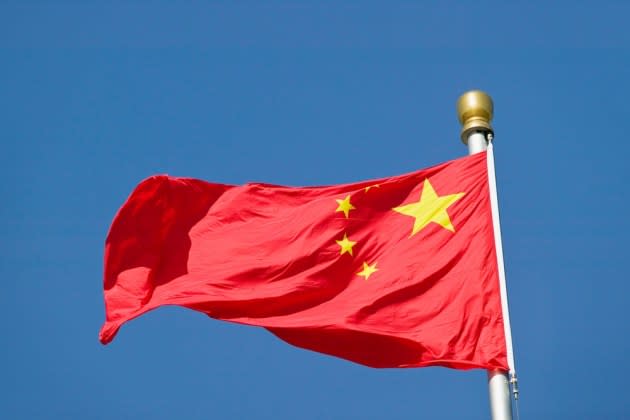Kharon Slapped With Chinese Tit-for-Tat Sanctions

China says that it has sanctioned a Los Angeles-based risk assessment firm and two individuals who have reported extensively on the persecution of Muslim minorities in the country’s northwestern Xinjiang Uyghur Autonomous Region.
In a press conference in Beijing on Tuesday, spokesperson Mao Ning said that the foreign ministry has taken “countermeasures” against Kharon; Edmund Xu, its director of investigations; and Nicole Morgret, a policy analyst at the U.S.-China Economic and Security Review Commission, for collecting “Xinjiang-related sensitive information and…so-called evidence for America’s illegal sanctions related to Xinjiang.”
More from Sourcing Journal
Kharon, Xu and Morgret will be prevented from entering mainland China, Hong Kong and Macau, Mao said, while any assets or property they have in China will be frozen. Individuals and organizations will also be barred from making transactions or otherwise cooperating with them.
Mao said that the sanctions were in retaliation for a recent U.S. government update on human rights in Xinjiang, which included new sanctions against two Chinese officials for “serious human rights abuses” against Uyghurs.
“By issuing the report, the U.S. once again spread false stories on Xinjiang and illegally sanctioned Chinese officials and companies citing so-called human rights issues,” Mao said. “This move constitutes grave interference in China’s internal affairs and violates the international law and the basic norms of international relations. The move is designed to vilify China and [is] harmful to the lawful rights and interests of relevant Chinese officials and companies. We firmly oppose and strongly condemn the move and have made serious démarches to the U.S. over this.”
Kharon, which was founded by former treasury officials, said Tuesday that because it has no presence in China, the action is “largely symbolic” and will not affect its operations or ability to serve its clients, including those that rely on its forced labor data to comply with the Uyghur Forced Labor Prevention Act, or UFLPA. The law, which went into effect last June, imposes a rebuttable presumption that all goods originating in whole or in part from Xinjiang are the product of modern slavery and therefore inadmissible to the United States.
“In service of our clients and all global businesses that seek to implement leading risk management programs, Kharon will continue to provide research and data analytics that is objective, independent and based on reliable sources,” the firm said.
Earlier this month, Kharon published a brief linking Chinese sportswear companies that have signed lucrative endorsement deals with National Basketball Association players to forced labor through vendors that receive cotton and other products from Xinjiang. Anta Sports and Li-Ning, for instance, were described in a 2022 investor presentation as “major end buyers” of Fountain Set Holdings, a knitted fabric manufacturer that boasts a long-term cotton supply contract with Huafu Holdings, according to a company disclosure. Aksu Huafu Textiles Co, a Huafu Holdings subsidiary, was placed on the UFLPA Entity List in 2022 for “working with the government of Xinjiang to recruit, transport, transfer, harbor or receive forced labor.”
Other Huafu subsidiaries in the textile industry, including Xinjiang Huafu Cotton Industry Group Co., have benefited from Xinjiang state-run aid and recruitment programs that “constitute red flags for the presence of forced labor,” Kharon said.
“While there is no evidence that Huafu’s products end up in Anta or Li-Ning shoes worn by NBA players, recent guidance by the U.S. Customs and Border Protection notes that businesses and industry must conduct due diligence measures to ensure compliance with U.S. laws and trace their supply chains for potential exposure to Xinjiang-origin goods or listed entities,” it added.
On Thursday, the Center for Advanced Defense Studies (C4ADS), a Washington, D.C.-based think tank, issued a “statement of support” for Morgret, who until October served as its human rights analyst.
“Amid ongoing efforts by the Chinese government to censor open and unbiased reporting on human rights and other critical issues, C4ADS stands in solidarity with Nicole, along with other analysts,” it said. “We urgently call for solidarity across the journalistic community, recognizing the potential vulnerability of all investigative journalists. As forces seek to silence members of the press and civil society, standing together becomes imperative for the protection of freedom and the pursuit of justice.”
The C4ADS published in October a report mapping the relationships between Xinjiang-based mines and global networks of finance and trade. Hundreds of American headliner companies like Apple, Mattel, Macy’s, Nvidia and Tesla are “directly or indirectly exposed” to suppliers that source gold from companies with Xinjiang-based mines that present risk indicators of forced labor, it said, violating the UFLPA and the Organisation of Economic Co-operation and Development’s responsible sourcing guidelines. Major asset management firms’ index fund portfolios also include companies that own similarly offending mines in the province, exposing their clients to human rights violations.
Last May, the organization dispatched an analysis characterizing Xinjiang’s economy as ”inextricably entangled” with forced labor and oppression. “The linkages between abuse and the economy are not contained within Xinjiang: through the global market, the rest of the world enables forced labor and repression perpetrated by the government of China,” it said.
